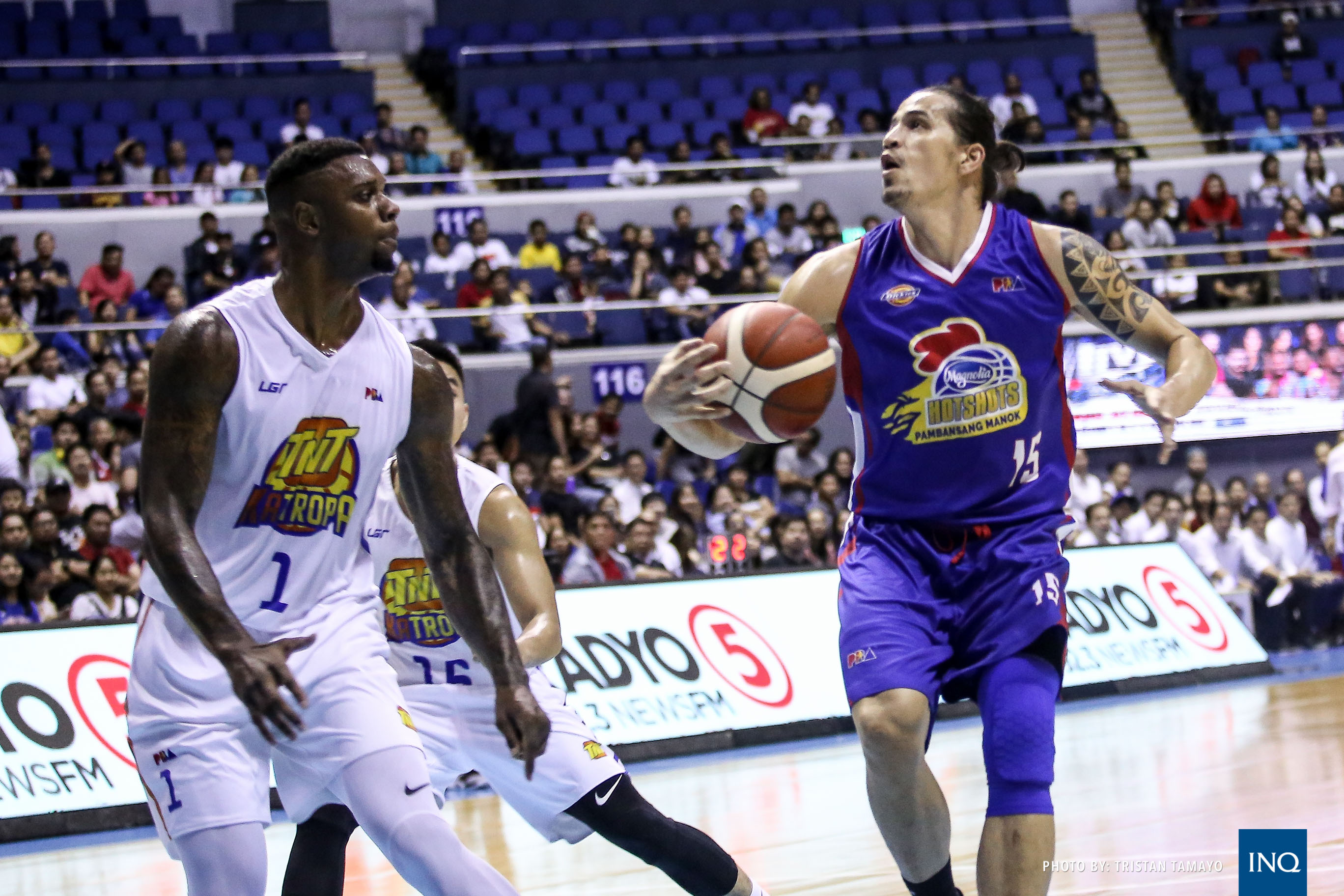
He called himself a “kid from the market” who dreamed of being in the Philippine Basketball Association (PBA) in a social media post where he announced his retirement.
Marc Pingris bucked a lot of odds to live that dream.
And that poor kid from a province up north who played outside of the country’s top collegiate leagues, has decided to walk away from basketball.
And understandably, this walking away needs a little getting-used-to.
“I still can’t believe that I’m no longer going to practice,” the Magnolia forward told SportsIQ three days after hanging his sneakers. “Part of it feels sad knowing you won’t be able to do the things you used to do, like waking up early [for training] and joking around with your teammates. But at the same time, I’m happy because now I have more time with my family.”
The well-loved Gilas Pilipinas standout said he had given retirement a lot of thought, talking to family, close friends and fellow players. And he also made sure he also checked on the person that retirement would matter the most—himself.
Grand slam
“I was starting to feel [ready to retire] already, too. I think, for me, it was also time to give myself time to rest,” he said.
Pingris, 39, had lived his PBA dream since 2004, when he was drafted third overall by defunct ballclub Air21. He has won nine championships, two of which he was named Finals Most Valuable Player, and is a multiple all-star. There are so many highlights in his career but Pingris singled out three moments that really stand out.
“When I was drafted, when my name was called. I was very happy. I never expected to be drafted, I think No. 3,” he said in Filipino. “Also, my first championship in the PBA with coach Ryan [Gregorio]. And of course, the [San Mig Coffee] Grand Slam [in 2014].”
Ask people what they remember most out of Pingris though, especially people who are not fans of the PBA teams he played for, and talk will inevitably drift to his stint with the national team, particularly to that semifinal outing against South Korea in the 2013 Fiba (International Basketball Federation) Asia championship held at Mall of Asia Arena.
Everyone crying
Gilas Pilipinas had just lost Marcus Douthit in the first half and Pingris was nursing a sprained foot after stepping on Korean veteran Kim Joo-sung’s foot. At halftime, with his teammates warming up, Pingris sat on the bench massaging his hamstring, which had taken the weight of him compensating for his inured ankle.
“I prayed,” Pingris said after that game, “I asked Him to help me not feel the pain.”
On one good leg, Pingris finished with 16 points and 10 rebounds, and gave Gilas Pilipinas what it needed the most: The heart to defeat an old nemesis. The Philippines defeated Korea, 86-79, and went on to play in the World Cup the following year, a first for the country in four decades.
“That moment when we won against Korea, that was the happiest because every Filipino was crying [out of joy],” Pingris said. “Everyone; people beside me, even if I didn’t know them, [they were saying] ‘thank you, thank you.’”
And, in what perhaps best defines Pingris as a person, he added: “Even if it was us who should have been thanking them.“We were thankful for the fans because of the energy they gave us,” he said. “[The fans] were really the key in that win, their cheers.”
Pinoy Sakuragi
Pingris was the heart that beat in that Gilas squad. His gallant stand against Korea’s bigs nursed the team’s confidence when things looked dim following Douthit’s exit.
He was the heart of every other squad he played for, too. And he gave each team everything he had every single night, often battling—and beating—taller players for rebounds. And in what he calls a happy coincidence, Pingris’ dogged determination earned him the moniker Pinoy Sakuragi, after the anime character Hanamichi Sakuragi of the popular Slam Dunk series.
“I was 10 or 12 [years old] and I was already watching Slam Dunk. And I really liked the guy’s character. But I never expected that’s what people would call me. But I was really happy people called me that because he was really my idol and we had the same [beginnings]. He started in track and field, I started in track and field.”
While Pingris is happy he gets to spend time with his family and focus on his business ventures, he said he isn’t turning his back completely on basketball.
Valuable lesson
“I’m open to mentoring young players,” he said. “I want to share what I know just as other players helped me when I was young. I just want to pass on [that knowledge]. It’s like a baton. It was once passed to me and I want to pass it on to [the younger players].”
It’s a knowledge athletes should take heed off, whether it’s basketball they are pursuing or otherwise.
“It’s not about what school you went to,” said Pingris. “It’s not about where you are from. Whether you’re from the north or what, [it means] nothing. It’s all in the heart. If you really like your work or your dream, persevere [and] practice.”
Take it from a kid from the market in a province up north who went to a relatively small basketball school. That kid became a multiple champion and the heart that beat proud the national team—and is walking away from his sport a legend.